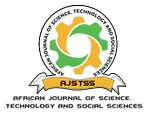Characterization and antimicrobial susceptibility of salmonella isolates from food sources of animal origin in Meru municipality, Kenya
DOI:
https://doi.org/10.58506/ajstss.v1i1.83Keywords:
salmonella isolates, drug resistanceAbstract
Salmonella infections originating from food sources have become a menace to the world. Salmonella causes gastroenteritis and eventually death especially to children below five years of age and individuals who are immunocompromised. Antibiotics are the major therapeutic means used to mitigate Salmonella species. However, in the recent past, studies have reported that Salmonella species have developed resistance to common drugs available in the market. This study aimed at isolation and characterization of salmonella species from food sources of animal origin in Meru Municipality, Kenya. To achieve this collected samples were subjected to culture and sensitivity testing where seventy-six (76) meat samples were collected from butcheries, hotels, supermarkets, and slaughterhouses. Of these 14 (18.4%) were found positive for salmonella species. Additionally, 72 egg samples were collected from vendors and these yielded a two percent (2.1%) prevalence of salmonella species. In 80 milk samples collected from milk vendors in Meru township, all the samples were found free of salmonella species. Antimicrobial susceptibility testing indicated that majority of the salmonella isolates (40%) were resistant to more than four of the tested antimicrobial agents. The study recommends further studies to determine gene sequence and thus check for base pair differences among the salmonella isolates obtained. This will enable understand mutational changes which could be attributable to reported antimicrobial drug resistance among the isolates. Data obtained will enable policy change especially on use of antimicrobial agents especially during treatment of food animals. The study recommends working together of key players in the health sector, environmental sector and animal health sector in a view to improving the one health strategy in the study area, which may later be cascaded to all other counties in the country and beyond.


